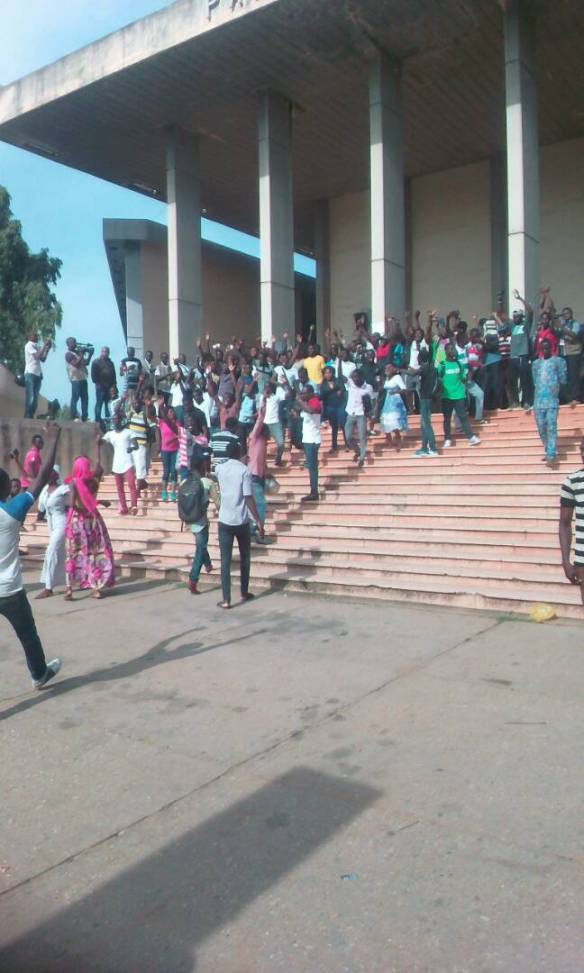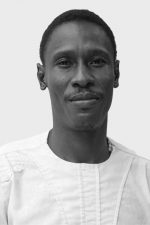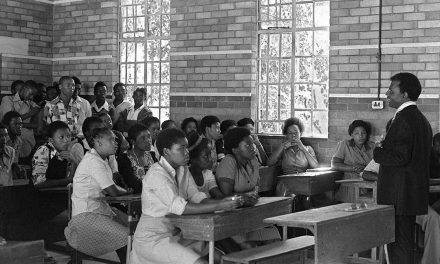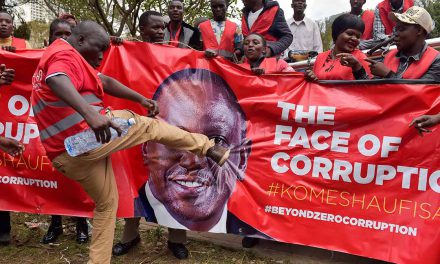
The president of Togo, Faure Gnassingbé Photo: Blamé Ekoue
Togo: fear and favour
The Gnasssingbé clan has been ruling Togo for more than 50 years.The late Eyadema Gnassingbé to power in January 1967, following what was described as the first coup d’état in black Africa, during which Sylvanus Olympio, the country’s first head of state, was assassinated. With strong military backing, the regime continues to dominate and maintain control over all levels of the country’s highly centralised government.
President Faure Gnassingbé, the son of the late Eyadema, says he is trying to modernise the country’s public institutions, including the judiciary. But a 2017 Afrobarometer survey conducted by the Center for Research and Opinion Polls (CROP) of more than 35 countries in Africa revealed that over 63% of Togolese do not have confidence in their judicial system.
The reasons cited included long delays in judicial processes, the complexity of the judicial system, the lack of advice or legal assistance, the inattention of judges, and high costs. Only 37% of Togolese citizens believe the country’s courts represent a credible justice system as against an average of 48% in the West African sub-region, according to the report.
Togolese citizens fear the justice system, seeing it either as not offering any sort of justice or as offering unfair justice. And a fear of public institutions leads citizens to mistrust them, Mathieu Agada, a Togolese psychologist told Africa in Fact. “Mistrust arises from fear. Fear is linked to anxiety about something. This means that something scares you. This would partly explain the feeling of mistrust towards our institutions, particularly the judiciary,” he said.
Others attribute widespread perceptions of public mistrust in the country’s judiciary to other sources, including pervasive corruption and a culture of impunity. According to Transparency International’s 2017 Corruption Perceptions Index 2017, Togo scores 32 on a scale of 0 (highly corrupt) to 100 (very clean), which places it in 117th position out of 180 countries. Civil rights organisations have been arguing for decades that the justice system needs to be more efficient and transparent, but have consistently encountered an administration that lacks the will to do anything about it.
As a result, members of the population often prefer to settle accounts on the streets with people they presume guilty of an offence. Mob justice is common, and presumed culprits are often assaulted. Mob justice is thought to be more common in rural areas, where mobs target people suspected of practising black magic and witchcraft. In urban areas, lynchings occur mainly when a person is suspected of theft or in cases of road rage.
In August 2015, Kwamé N’Dri, an Ivorian national accused of theft, was lynched to death by a mob in a suburb of the Togolese capital. A group of young people started beating him up without giving him time to explain himself, according to an eye witness. “They sprayed him with gasoline and burnt him alive on the national highway leading to Burkina Faso. Upon seeing a police car, they fled,” Alain Bamaze told Africa in Fact. He added that members of the group had said there was “no point” in going to the police.
Unusually, the authorities expressed concern. The ministers of justice and of security and civil protection issued a joint communiqué calling on people “to have confidence in the judiciary as well as the security forces whenever they find themselves in a situation of crime and offence”. Damehane Yark, the minister of security and civilian protection, warned that “any act or behaviour inciting mob justice is highly reprehensible and the authors or accomplices will expose themselves to the rigour of the law”.
Yet the lynchings continue. In August last year, a man accused of robbing a shop was assaulted and burnt alive in the town of Kara, some 400 km from the capital. “Discouraged by incompetent justice, people today prefer to do justice themselves,” says Paul da Silveira, a Togolese sociologist working for a local NGO, Programme International de Volontariat et d’Échange Culturel (PIVEC), which promotes human rights in detention centres.
No official figures are available for the number of incidents of mob justice. Emmanuel Vivien Tomi, a Togolese researcher and filmmaker, puts it at an average of 15 cases every year. In a recent film, Crime at the Drugstore, he seeks to raise awareness about the phenomenon that has become so recurrent in Togo. “My new film is part of a fight against the tragic scenes often seen in the streets of Togo, with people indulging in mob justice without restraint,” he told Africa in Fact.
Others point to social inequality as a cause of mob justice in Togo. “It’s not only lack of confidence in the system that leads to mob justice,” argues Mathieu Agada , a psychologist at Lomé-based BIASA International Hospital. “Other frustrations accumulate, and sometimes people look for a scapegoat.”
According to civil rights organisation Action by Christians for the Abolition of Torture (ACAT-Togo), “popular justice” has its roots both in a real survival instinct and the frustration felt by citizens who for many years have suffered poverty, endemic corruption, state aggression, and theft of their property and savings. The organisiation says this frustration is exacerbated by perceptions that the police do not play a protective role in society and that the justice system is inherently corrupt – both symptoms of a failed state.
In 2015, the Togolese government launched a plan to modernise the justice system, with the financial and technical support of the EU, as part of an action plan for 2016-2020 aimed at attaining UN Sustainable Development Goal 16, access to justice for all. But sceptical human rights activists argue that the state’s centralisation of power is in itself an obstacle to achieving this aim.
“The psychology of the regime is based on maintaining a grip on all institutions,” says lawyer Raphael Kpande Adjare, who defended a Togolese student leader sentenced with other student activists in January this year to three year’s imprisonment for defying a ban on holding a press conference. Adjare argues that it is difficult to see how the state can introduce a transparent and impartial justice system, when the state uses that institution to repress political opponents and to stay in power.
In his address to the nation in 2018, President Gnassingbé promised to take action in the coming years to improve the justice system. This, he said, would help to promote the rule of law. “We will continue to support the functioning of strong democratic institutions that work effectively to promote the rule of law and individual and collective freedoms,” he said. “To achieve a more efficient and less expensive justice system, we will consider the establishment of courts throughout the country.”
But critics say state officials must first seek an improvement in their own ethical practices if they are to build confidence in the justice system. Any reforms will not only face the problem of centralisation, but also of the pervasive corruption of the system.
“We must first address corruption if we are to bring about confidence in our criminal justice system,” says a Togolese who was convicted of setting fire to the country’s two central markets in 2012 but pardoned last year by the president after six years in jail (he insisted on anonymity). After being released on bail and placed under judicial supervision, he continues to proclaim his innocence regarding the incident, which also saw many opposition leaders arrested for their alleged involvement. “Popular dissatisfaction undermines confidence in public institutions, also undermining government legitimacy,” he told Africa in Fact. “Personally, I have lost trust in our justice system.”
However, Justice Minister Puis Agbetomey says he is confident that the plan to modernise Togo’s judicial system will turn the wheel of justice in the right direction. “The law is the bulwark for any society that loves justice and peace. The judicial system safeguards this law. Through the implementation of several reforms, Togo is gradually moving forward by providing the means to make [our] justice system independent, fair and respectful of human rights,” he told a meeting in January this year to launch a campaign financed by the EU to speed up the processing of Supreme Court cases.
On 23 January this year, Togo’s Supreme Court announced that it would process 500 cases dating from between 1994 and 2010 in “extraordinary sittings” over the next six months; many complainants have been waiting for years for the court to hear their cases. Supreme Court President Gamato Akakpovi said the campaign marked a new era: judicial officials would be required to serve the Togolese people and “talk the law, and only the law”.
Critics, however, remain sceptical – and wary. Kpande Adjare, the lawyer, says the Togolese will continue to mistrust their government until it respects the separation of powers between the legislature, the executive and the judiciary. Da Silveira, the sociologist, says the rule of law will not take root in Togolese society if the current situation of widespread mistrust of the judicial system continues. Even if the government makes a sincere effort at reform, “the path is still long,” says Hervé Akinocho, a research coordinator at CROP, “before Togolese people will have confidence in their justice system.”

Students protest on the steps of Lomé court building at the trial of a student leader arrested for trying to convene a press conference Photo: Blamé Ekoue
Blame Ekoué is the Togo correspondent for the BBC and for Paris-based media house, ANA. He has also reported for Associated Press and Radio France International. He holds a BA in Communications from the Leader Institute in Lomé. Formerly deputy editor of the West Africa Revue, he has been a contributor to the Lome-based Business and Finance magazine since 2015.














